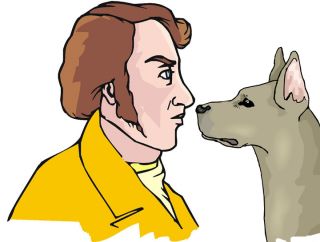Intelligence
Dogs, Cats, Classical Music, and Frédéric Chopin
Classical music calms dogs, and a dog inspired Chopin's piano composition.
Posted December 20, 2012
I recently encountered a new study that looked at the response of dogs to various types of music. This one, out of Colorado State University, was authored by a team headed by psychologist Lori Kogan. It followed a pattern similar to other research on this topic, which involves monitoring the responses of shelter dogs while they are exposed to various types of music. This new research confirmed earlier findings that while heavy metal music tended to arouse and disturb the dogs, classical music (things like Beethoven's Ode to Joy), tended to calm and relax the dogs. One surprise was that traditional classical music tended to work better then the simplified, slower tempo, classical music which is often marketed in CDs specially designed for dogs.

While these results were very interesting, it set me to thinking about one composer who actually appears to have been inspired to write classical music by a dog. Frédéric Chopin was a Polish composer and virtuoso pianist. He is widely considered to be one of the greatest Romantic composers. He was a frail individual and died at the age of 39 (probably of cystic fibrosis). Chopin was not noted as much of an animal lover; however he lived for several years with French author and feminist Amandine Aurore Lucille Dupin (the Baroness Dudevant) who is better known by her pseudonym, George Sand. Along with her two children the Sand houshold household was completed by a dog named Marquis and a cat named Valdeck.
Supposedly it is because of the dog Marquis that Chopin wrote his very popular Waltz in D-flat, Op. 64, No. 1. You probably know it best as the Minute Waltz, commonly pronounced "min' it." A publisher gave the waltz that nickname because it was short, and therefore minute (my noot), not because it can or should be played in a minute (although that hasn’t stopped people from trying). Chopin himself referred to it as the Little Dog Waltz. The story goes that Marquis was chasing his tail on the garden terrace when Sand said to Chopin: “If I had your talent, I would compose a fortepiano piece for this dog.” Chopin immediately went to his piano and did exactly that. It is interesting to listen to this piece with your eyes closed, because then it is quite easy to imagine a dog playfully spinning around. Chopin was fond enough of this piece that he included it in his final concert in Paris, in 1848, the year before he died.
Apparently Chopin's music was not only inspired by George Sand's dog, but also by her cat, Valdeck, who would occasionally run across the keyboard of Chopin's piano. After one such incident Chopin wrote Waltz in F Major, Op. 34, No. 3 which he called The Cat Waltz. In the middle of the piece (about a minute into it) one can hear the pitter patting sounds that the cat makes as he races across the keyboard. To my ear this is much like a "sound cartoon."
The final piece of music that may have been inspired by a dog was Chopin's Funeral March, the Piano Sonata in B minor, Op. 58. There is much controversy among musicologists as to what inspired this particular piece, although it is known that it was written in several sections, each composed at different times. However George Sand insisted that its completion was inspired by the death of her dog Marquis. I personally find it difficult to imagine that the same dog that inspired the light spinning notes in the "Little Dog Waltz" also inspired this ponderous piece of work, however George Sand was there at the time and I was not.
Stanley Coren is the author of many books including: Born to Bark; Do Dogs Dream? The Modern Dog; Why Do Dogs Have Wet Noses? The Pawprints of History; How Dogs Think; How To Speak Dog; Why We Love the Dogs We Do; What Do Dogs Know? The Intelligence of Dogs; Why Does My Dog Act That Way? Understanding Dogs for Dummies; Sleep Thieves; The Left-hander Syndrome
Copyright SC Psychological Enterprises Ltd. May not be reprinted or reposted without permission


